 Star of the Month: Jack Lemmon Arguably film's most affable Everyman, Jack will be the subject of a 25-title retrospective, running Wednesdays in January - as well as separate posts here.
Star of the Month: Jack Lemmon Arguably film's most affable Everyman, Jack will be the subject of a 25-title retrospective, running Wednesdays in January - as well as separate posts here.Recurring Feature Throughout the Month: "New York vs. Los Angeles," a series of films set in both locales - i.e, Woody Allen's "Annie Hall" (1977) and Arthur Hiller's "The Out-of-Towners" (1969).
Also: George Sidney's bad, bad "Bye, Bye Birdie" (the worst!) ... Henry Koster's "Floweer Drum Song," a recent National Film Registry inductee ... Jerrold Freedman's superior B-movie, "Kansas City Bomber" ... Troy and Connie in "Susan Slade" and "Palm Springs Weekend" ... Truffaut's seminal "Jules et Jim" ... William Wyler's "The Children's Hour," intelligent, empathetic and well-acted ... Bud Yorkin's very fine "Divorce, American Style" ... and Hitch's hugely entertaining "North by Northwest"...
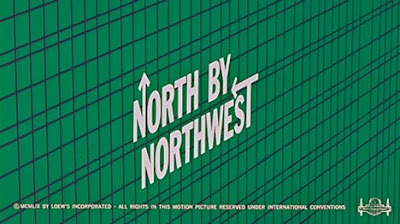 Alfred Hitchcock's "North by Northwest" (Saturday, 3 January at 3:30 p.m., est.) Hitch's compulsively watchable 1959 film - yet another masterful blend of intelligent suspense and fascinating psychology - conclusively confirms him as the master Poet Laureate of case studies about people, usually innocent, in the throes of alienation. Here, a smoothly befuddled yet cogently shrewd Cary Grant cannot trust just about anyone. A title which has always existed, cozily, somewhere in the middle of Hitchcock's filmography, "North by Northwest" has grown and evolved since its August, 1959 debut at Radio City Music Hall. It's perfect. This time around, savor Bernard Hermann's rushing music score and Eva Marie Saint's new slant on the Hitchcock blonde, a take that has remained impressively contemporary for 50 years now.
Alfred Hitchcock's "North by Northwest" (Saturday, 3 January at 3:30 p.m., est.) Hitch's compulsively watchable 1959 film - yet another masterful blend of intelligent suspense and fascinating psychology - conclusively confirms him as the master Poet Laureate of case studies about people, usually innocent, in the throes of alienation. Here, a smoothly befuddled yet cogently shrewd Cary Grant cannot trust just about anyone. A title which has always existed, cozily, somewhere in the middle of Hitchcock's filmography, "North by Northwest" has grown and evolved since its August, 1959 debut at Radio City Music Hall. It's perfect. This time around, savor Bernard Hermann's rushing music score and Eva Marie Saint's new slant on the Hitchcock blonde, a take that has remained impressively contemporary for 50 years now.
Gene Kelly & Stanley Donen's "It's Always Fair Weather" (Sunday, 4 January at 12:45 a.m., est.) Kelly and Donen had a scathingly brilliant idea of doing a follow-up to their "On the Town" success (airing on Turner on Thursday, 8 January at 8 p.m., est.), checking in with their three sailors years later, during a reunion in - where else? - New York. With neither Frank Sinatra nor Jules Munchin available, the project looked like history but Kelly and Donen willfully pushed ahead with it anyway, despite less-than-enthusiastic support from MGM. (The musical genre was starting to wane.) Perhaps because of this uphill battle, the resulting 1955 film (about GIs rather than seabees) is something of a minor masterpiece - much, much better than the overrated "On the Town" - and the supporting cast of Michael Kidd and Dan Daily (in for Sinatra and Munchin) and the equally sublime Dolores Gray and Cyd Charisse seems to know it's into something good, possibly great. Belatedly, moviegoers came to feel the same way. Two of film's most under-utliized dancing personalities, Daily and Charisse, are in their prime here.
 Jerrold Freedman's "Kansas City Bomber" (Sunday, 4 January at 4:30 a.m., est.) If one performance proves that Raquel Welch can be an actress of range and invention, it's the one firmly embedded in the middle of this companionable 1972 B-movie that revolves around the then-Roller Derby craze. Here, she uses her statuesque body and powerful limbs to plumb the depths of amibition and grief of a desperate woman - a single mother of two - with no resources other than her sheer guts and willfulness. There isn't a moment in this fine little film when Welch isn't wholly believable. She shares one particularly memorable scene with a very young Jodie Foster as her alienated daughter and quite a few with Kevin McCarthy as her duplicitous, sleazy boss and Helena Kallianiotes, Norman Alden and Jeanne Cooper as other derby denizens. Tom Rickman ("Coal Miner's Daughter") and Barry Sandler ("Making Love") worked on the script with Calvin Clements Sr. The solid direction is by Jerrold Freedman, a TV hand who also helmed 1986's "Native Son" (from the Richard Wright book) but who has remained largely in TV.
Jerrold Freedman's "Kansas City Bomber" (Sunday, 4 January at 4:30 a.m., est.) If one performance proves that Raquel Welch can be an actress of range and invention, it's the one firmly embedded in the middle of this companionable 1972 B-movie that revolves around the then-Roller Derby craze. Here, she uses her statuesque body and powerful limbs to plumb the depths of amibition and grief of a desperate woman - a single mother of two - with no resources other than her sheer guts and willfulness. There isn't a moment in this fine little film when Welch isn't wholly believable. She shares one particularly memorable scene with a very young Jodie Foster as her alienated daughter and quite a few with Kevin McCarthy as her duplicitous, sleazy boss and Helena Kallianiotes, Norman Alden and Jeanne Cooper as other derby denizens. Tom Rickman ("Coal Miner's Daughter") and Barry Sandler ("Making Love") worked on the script with Calvin Clements Sr. The solid direction is by Jerrold Freedman, a TV hand who also helmed 1986's "Native Son" (from the Richard Wright book) but who has remained largely in TV. Delmer Dave's "Susan Slade" (Monday, 4 January at 2 p.m., est.) Delmer Dave's third-act career, which spanned from the mid-1950s to the mid-'60s, was neatly divided into two well-defined sections - his Westerns (made mostly for Columbia) and his soaps (made exclusively for Warners). The former group is represented by such estimable titles as "Jubal," "The Hanging Tree," "Cowboy," "The Last Wagon," "Drum Beat," "The Badlanders" and, of course, "3:10 to Yuma," all made between 1954 and 1959. His soap period also kicked off in '59, with "A Summer Place," whose popularity led to a trilogy that includes "Parrish" and "Susan Slade" (both from 1961), all starring Troy Donohue.
Delmer Dave's "Susan Slade" (Monday, 4 January at 2 p.m., est.) Delmer Dave's third-act career, which spanned from the mid-1950s to the mid-'60s, was neatly divided into two well-defined sections - his Westerns (made mostly for Columbia) and his soaps (made exclusively for Warners). The former group is represented by such estimable titles as "Jubal," "The Hanging Tree," "Cowboy," "The Last Wagon," "Drum Beat," "The Badlanders" and, of course, "3:10 to Yuma," all made between 1954 and 1959. His soap period also kicked off in '59, with "A Summer Place," whose popularity led to a trilogy that includes "Parrish" and "Susan Slade" (both from 1961), all starring Troy Donohue.Connie Stevens was a Warners TV actress ("77 Sunset Strip"/"Hawaiian Eye") who had a co-starring role in "Parrish" and the lead title role in "Susan Slade," in which she's excellent as an unwed mother forced to live a double life when her mother (Dorothy Maguire), in an effort to protect Susan, opts to pose as the mother of the child. There is something so internal and timorous about Stevens' handling of the role that one could well imagine her as a Hitchcock blonde. (There are shades of "Marnie" here.) Stevens had fun in the comic William Conrad thriller, "Two on a Guillotine" (1965) and in Bud Yorkin's "Never Too Late" (also '65), from the Broadway comedy, and she appeared in Robert Aldrich's "The Grissom Gang" (1971), in which she shared the screen with Kim Darby - the ex-wife of Stevens' ex-husband, James Stacy. Got that?
But her film career never took off. There were reports that the role that Stevens really wanted was Eliza Doolittle in Warners' film of "My Fair Lady," but Jack Warner refused to entertain the thought. Too bad. I've a hunch she could have pulled it off. Getting back to Daves, he ended his career at Warners, directing "Rome Adventure" (1962), new to DVD; "Spencer's Mountain" (1963), long available on home entertainment, and "Youngblood Hawke" 1964) and "The Battle of the Villa Fiorita" (1965), two titles that, for all intents and purposes, are lost.
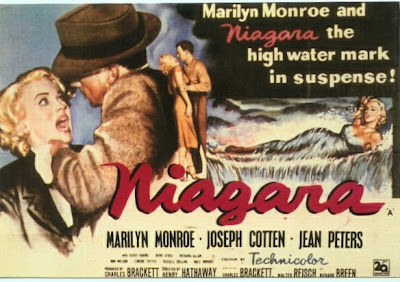
 Henry Hathaway's
Henry Hathaway's"Niagara" (Sunday, 11 January at 8 p.m., est.) Nasty fun. Hathaway's seedy little tale of infidelity and murder was the only film during her lifetime to exploit the dark side of star Marilyn Monroe. (Roy Ward Baker's earlier "Don't Bother to Knock" just barely touched on it.) This was the first - and only - time we'd see a deadly Monroe; after the Howard Hawks twins, "Monkey Business' and "Gentlemen Prefer Blondes," things were never quite the same.

The "Maisie" Series (Tuesday, 13 January, starting at 6 a.m., est, until 5:45 p.m.) Elemental and essential. Turner screens eight - count 'em - eight "Maisie" features, made between 1939 and 1946, each running 90 minutes or less and starring the unsinkable Ann Sothern. The filmmakers include Edwin L. Marin, H.C. Potter, Norman Z. McLeod, Roy Del Ruth and Harry Beaumont but the staple is Sothern who turns a series of '40s programmers into vivacious star turns. Get ready to settle in for the day.
 William Wyler's "The Children's Hour" (Friday, 16 January at 8 p.m., est.) Underrated in its day, Wyler's 1961 adaptation of the Lillian Hellman play is one of those rare (and fortunate) films belatedly appreciated with age. I've no idea if the movie was always under-appreciated or if it actually improved with advancing years. Probably a little of both.
William Wyler's "The Children's Hour" (Friday, 16 January at 8 p.m., est.) Underrated in its day, Wyler's 1961 adaptation of the Lillian Hellman play is one of those rare (and fortunate) films belatedly appreciated with age. I've no idea if the movie was always under-appreciated or if it actually improved with advancing years. Probably a little of both.The story of two teacher's whose lives are ruined by a lie that turns out to be half-true (or maybe not), "The Children's Hour" boasts stellar performances by Audrey Hepburn (who uses her face most expressively in the concluding scenes) and particuarly Shirley MacLaine (who has a bravura turn near the end). But this time out, pay attention to Franz Planer's evocative cinematography (which makes sure that the material, which is essentially still stagebound, is never static); the gorgeous music score by Alex North; the terrific supporting work by two old Grand Dames, the singular Miriam Hopkins and the commanding Fay Bainter (who was Oscar-nominated here), and the performances of two young actresses, the always good Veronica Cartwright (Hitchcock's "The Birds" and, many years later, Philip Kaufman's remake of "Invasion of the Body Snatchers") and, in the difficult central role, the remarkable Karen Balkin, who would make only one more film, Peter Hyams' 1974 "Our Times."
A sad waste.
Wyler, of course, filmed this material (with Hopkins in the MacLaine role) in 1936 under the title "These Three" (and with all hints of homosexuality removed). Ironically, for a while, United Artists dickered with the idea of also changing the title of the remake - to the nondescript "The Infamous."
The brass thought that "The Children's Hour" would mislead audiences into thinking it was a family film. Wyler balked. The title stayed.
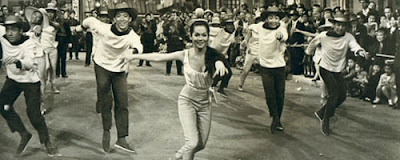
 Henry Koster's
Henry Koster's"Flower Drum Song" (Sunday, 18 January at 2:15 p.m., est.) Another late-bloomer. Koster's delightful musical comedy - the most bearable of all Rodgers and Hammerstein shows - was recently added by the National Film Registry to its ever-growing list of of films that are “culturally, historically or aesthetically” significant. (Check out Dave Kehr for the inside dope.) The movie was - and remains - revolutionary for its all-Asian cast. The only Caucasian character in it, tellingly, is a vagrant played by Herman Rudin who robs Benson Fong on his front doorstep.
The glorious Rodgers and Hammerstein score - their jazziest - was overseen by the reliable R-&-H team of Alfred Newman and Ken Darby and Hermes Pan, Astaire's house choreographer, designed the many wonderful dance sequences. This time, keep your eye on "Sunday," "Grant Avenue," the "Love, Look Away" dream ballet and the hilarious, inventive hoedown during "Chop Suey," all executed without the help of excessive editing that flaws so many modern movie musicals. I'll have more to say about Pan in a separate post. Also worth noting: Jack Soo's amusing, prolonged impersonation of Dean Martin; Russell Metty's color-embracing cinematography that matches Dong Kingman's gorgeous titles are, and the wide array of costumes of veteran designer Irene Sharaff, who repeated her Broadway assignment here.
All in all, terrific musical deserving of the late evaluation it's received.
 George Sidney's "Bye, Bye Birdie" (Sunday, 18 January at 8 p.m., est.) The worst. Period. It's been rumored for years now that most of the 1963 Columbia film's participants hate it, save for the grotesquely miscast Ann-Margret (as a 14-year-old!). And why should she hate it? Sidney, after all, worshipped her with his camera (as he would do a year later in the equally awful "Viva Las Vegas"). Gower Champion, who helmed the piece on Broadway, was supposed to make his directorial film debut with this project, but left it early on, reportedly because of the liberties taken with the material. (Half of the stage songs are missing, along with a few choice jokes.) He was planning on casting Jack Lemmon and Debbie Reynolds in the leads, and would subsequently make his directing debut with Reynolds' charming (and lost) "My Six Loves," released by Paramount the same year as "Birdie."
George Sidney's "Bye, Bye Birdie" (Sunday, 18 January at 8 p.m., est.) The worst. Period. It's been rumored for years now that most of the 1963 Columbia film's participants hate it, save for the grotesquely miscast Ann-Margret (as a 14-year-old!). And why should she hate it? Sidney, after all, worshipped her with his camera (as he would do a year later in the equally awful "Viva Las Vegas"). Gower Champion, who helmed the piece on Broadway, was supposed to make his directorial film debut with this project, but left it early on, reportedly because of the liberties taken with the material. (Half of the stage songs are missing, along with a few choice jokes.) He was planning on casting Jack Lemmon and Debbie Reynolds in the leads, and would subsequently make his directing debut with Reynolds' charming (and lost) "My Six Loves," released by Paramount the same year as "Birdie." About the only positives in the film are Maureen Stapleton's bruskness as Dick Van Dyke's edgy mother and Janet Leigh, ever the good sport and team player, making the best of a bad situation. (Leigh once confided in me that when it came to her musicals, she preferred Richard Quine's "My Sister Eileen," airing on Turner on Thursday, 8 January at 12 a.m., est.) If you want to see the real "Bye, Bye Birdie," stay with Gene Saks' excellent (and faithful) version made for TV in 1995.
Speaking of Reynolds, check out her two entertaining films that bookend the "Bye, Bye Birdie" showing - George Marshall's bit of homespun charm, "The Mating Game" (Sunday, 18 January at 6:15 p.m., est.), and Bud Yorkin's deliciously acidic and sophisticated "Divorce, American Style" (Sunday, 18 January at 10 p.m., est.)
Speaking of "Divorce, American Style," take note of the funny sequence which Reynolds and Dick Van Dyke share with their respective divorce lawyers, played by Shelly Berman and Dick Gautier - both of whom had a history with Van Dyke at the time. Berman and Van Dyke had appeared on Broadway with Nancy Walker and Bert Lahr in the 1959 musical revue, "The Boys Against the Girls," and, a year later, Gautier played the title role in Van Dyke's aforementioned "Bye, Bye Birdie." (Too bad Columbia didn't recruit the witty Gautier to recreate his stage role for its film of "Birdie" instead of that gyrating blank, Jesse Pearson.)
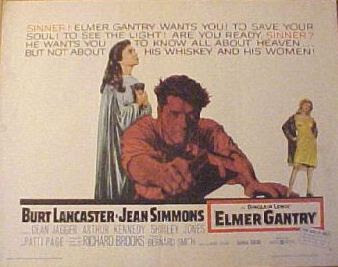 Richard Brooks' "Elmer Gantry" (Monday, 19 January at 1:45 p.m., est.) Ah, and here we have Brooks' grand, panoramic 1960 showcase of the screen-embracing Burt Lancaster in possibly his most expansive, sexually threatening performance as a hard-drinking, pleasure-loving, low-down traveling preacher/scam artist. Lancaster's brand of thuggery is consistently entertaining. You heard this before but this time, it's true - you can't take your eyes off him. Co-starring the inexpendable Jean Simmmons, Arthur Kennedy, Patti Page, Hugh Marlowe, Edward Andrews, John McIntire, Dean Jagger and an Oscar-winning Shirley Jones.
Richard Brooks' "Elmer Gantry" (Monday, 19 January at 1:45 p.m., est.) Ah, and here we have Brooks' grand, panoramic 1960 showcase of the screen-embracing Burt Lancaster in possibly his most expansive, sexually threatening performance as a hard-drinking, pleasure-loving, low-down traveling preacher/scam artist. Lancaster's brand of thuggery is consistently entertaining. You heard this before but this time, it's true - you can't take your eyes off him. Co-starring the inexpendable Jean Simmmons, Arthur Kennedy, Patti Page, Hugh Marlowe, Edward Andrews, John McIntire, Dean Jagger and an Oscar-winning Shirley Jones."Elmer Gantry" will be repeated Sunday, 1 February at 12 a.m., est.
 Elia Kazan's "A Face in the Crowd" (Tuesday, 20 January at 12:45 p.m., est.) Employing a distinctly physical (and fierce) acting technique, Andy Griffith - brand-new to films at the time - fully inhabits his role of the white trash Lonesome Rhodes, a recidivist who actually has talent as a singer and is groomed to be a radio star by a group of better educated people who, alas, are blind to Lonesome's brand of naked opportunism. They are played by Patricia Neal, Walter Matthau and Anthony Franciosa, plus Lee Remick is on hand as Lonesome's breif, white-trash young wife. But Griffith is the one to watch here. He's downright primal.
Elia Kazan's "A Face in the Crowd" (Tuesday, 20 January at 12:45 p.m., est.) Employing a distinctly physical (and fierce) acting technique, Andy Griffith - brand-new to films at the time - fully inhabits his role of the white trash Lonesome Rhodes, a recidivist who actually has talent as a singer and is groomed to be a radio star by a group of better educated people who, alas, are blind to Lonesome's brand of naked opportunism. They are played by Patricia Neal, Walter Matthau and Anthony Franciosa, plus Lee Remick is on hand as Lonesome's breif, white-trash young wife. But Griffith is the one to watch here. He's downright primal.A vivid cautionary tale that was ahead of its time and is totally pertinent today, "A Face in the Crowd" is the kind of movie where one keeps discovering little secrets. Lee Remick co-stars as the grasping young woman who matches Lonesome in his naked ambition, highly recognizable in these times.
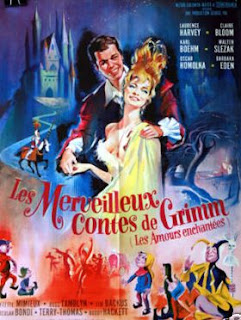
A rare showing of the George Pal/Henry Levin's "The Wonderful World of the Brothers Grimm," an elaborate 1962 fantasy and only one of two films actually made in Cinerama (the other being "How the West Was Won," of course, from the same year), airing Wednesday, 21 January at 5:15 p.m., est.
Joseph Mankiewicz's "All About Eve" (Thursday, 22 January at 11:45 p.m., est.)

Here we have dueling divas, an acerbic theater critic and some of the best dialogue ever. Stay up late and watch Billy Wilder's "Sunset Boulevard" afterwards (Friday, 23 January at 2:15 a.m., est.) and then decide if respective stars Bette Davis and Gloria Swanson deserved to lose their pushy Oscar bids that year (1950) to "Born Yesterday's" modest Judy Holliday.

Norman Taurog's "Palm Springs Weekend" (Sunday, 25 January at 4 p.m., est.) If you can't beat 'em, join 'em. American-International had honed in on the youth market with its fairly deadly "Beach Blanket" flicks, and Warners, with its stable of young players (Donahue and Stevens again, Ty Hardin, Robert Conrad and Stefanie Powers), decided to give them some competition. Actually, all of this started with MGM's bizarre "Where the Boys Are" (a surf-and-sand romp that has a vicious gang rape smack-dab in its middle), and, for what it's worth, Taurog's film is slightly closer to Henry Levin's "Boys" than to William Asher's "Beach Blanket" movies. Look for the late columnist Shirley Eder in a cameo appearance with Stefanie Powers, set in a record store.Asher's "Beach Blanket Bingo" follows (Sunday, 25 January at 6 p.m., est.)
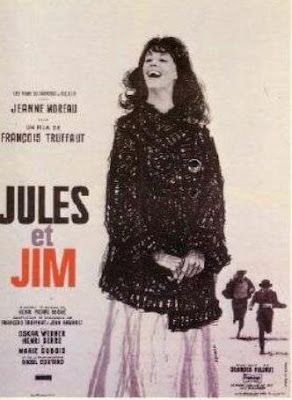 Francois Truffaut's "Jules et Jim" (Monday, 26 January at 2 a.m., est.) Truffaut's seminal 1962 French classic is about a male friendship that's both threatened and enriched when a free-spirited woman (are there any other kind in some movies?) penetrates its dark, secretive recesses, signaling a slow, potentially painful dissolution of a former life and an introduction to a compelling new one. Oskar Werner and Henri Serre are the philosphical men and Jeanne Moreau is the thrilling woman who introduces the idea of liberation and a new way of looking at and approaching life.
Francois Truffaut's "Jules et Jim" (Monday, 26 January at 2 a.m., est.) Truffaut's seminal 1962 French classic is about a male friendship that's both threatened and enriched when a free-spirited woman (are there any other kind in some movies?) penetrates its dark, secretive recesses, signaling a slow, potentially painful dissolution of a former life and an introduction to a compelling new one. Oskar Werner and Henri Serre are the philosphical men and Jeanne Moreau is the thrilling woman who introduces the idea of liberation and a new way of looking at and approaching life.
Lesser known, American but definitely worth you while is Irvin Kershner's "The Hoodlum Priest" (Tuesday, 27 January at 11 a.m.), a quietly powerful little drama with the ever underrated Don Murray as the real-life activist priest, Charles Clark in a pleasing acting duet with Keir Dullea as a young hood on death row. Acting vets Larry Gates and Logan Ramsay round out the cast, and a lovely young actress named Cindi Wood is the female lead. She made only two films, both in 1961 - this and Robert Mulligan's "The Great Imposter," opposite Tony Curtis. She died young in 1983 following a long illness. A sad loss.
 Douglas Sirk's "Imitation of Life" (Thursday, 29 January at 2 p.m., est.) makes for a good afternoon watch, thanks to Sirk's inimitable storytelling sense and star Lana Turner's slyly witty turn as an actress given to dramatics. Made in 1959. Later in the evening, there will be a series of '60s-'70s urban romantic comedies (starting at 8 p.m., est) - Woody Allen's 'Annie Hall," Albert Brooks' "Modern Romance," Billy Wilder's "The Apartment" and Hal Ashby's "Shampoo."
Douglas Sirk's "Imitation of Life" (Thursday, 29 January at 2 p.m., est.) makes for a good afternoon watch, thanks to Sirk's inimitable storytelling sense and star Lana Turner's slyly witty turn as an actress given to dramatics. Made in 1959. Later in the evening, there will be a series of '60s-'70s urban romantic comedies (starting at 8 p.m., est) - Woody Allen's 'Annie Hall," Albert Brooks' "Modern Romance," Billy Wilder's "The Apartment" and Hal Ashby's "Shampoo."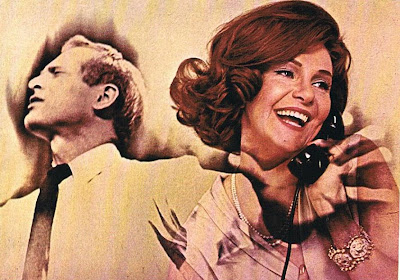 Richard Brooks' "Sweet Bird of Youth" (Friday, January 30 at 10:30 p.m.) Paul Newman and co-star Geraldine Page reprised their Broadway roles for Brooks' entertaining adaptation of the Tennessee Williams drama. In it, Newman, as a scam artist, returns to his hometown with aging movie queen Page in tow. For my money, this is the best Tennessee Williams adaptation ever, in which Newman played Chance Wayne to Geraldine Page's Alexandra Del Lago. What marvelous names! Ed Begley won an Oscar for his performance as the town boss. Preceded by Robert Aldrich's "Hush ... Hust, Sweet Charlotte" (Friday, 30 January at 8 p.m., est.), a tangy Mint-Julep-of-a-movie with an arsenic chaser and followed by Charles Laughton's "The Night of the Hunter" (Saturday, 31 January at 12:45 a.m., est.), a merry bit of derangement cinema, and Lou Adler's "Ladies and Gentlemen, The Fabulous Stains" (Saturday, 31 January at 2:30 a.m., est.), starring a young Diane lane as a punk rocker..
Richard Brooks' "Sweet Bird of Youth" (Friday, January 30 at 10:30 p.m.) Paul Newman and co-star Geraldine Page reprised their Broadway roles for Brooks' entertaining adaptation of the Tennessee Williams drama. In it, Newman, as a scam artist, returns to his hometown with aging movie queen Page in tow. For my money, this is the best Tennessee Williams adaptation ever, in which Newman played Chance Wayne to Geraldine Page's Alexandra Del Lago. What marvelous names! Ed Begley won an Oscar for his performance as the town boss. Preceded by Robert Aldrich's "Hush ... Hust, Sweet Charlotte" (Friday, 30 January at 8 p.m., est.), a tangy Mint-Julep-of-a-movie with an arsenic chaser and followed by Charles Laughton's "The Night of the Hunter" (Saturday, 31 January at 12:45 a.m., est.), a merry bit of derangement cinema, and Lou Adler's "Ladies and Gentlemen, The Fabulous Stains" (Saturday, 31 January at 2:30 a.m., est.), starring a young Diane lane as a punk rocker..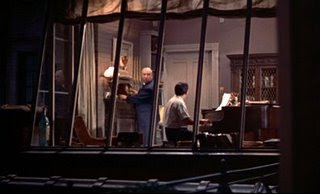

Alfred Hitchcock's "Rear Window" (Saturday, 31 January at 1:30 p.m.). You've seen it a million times. You know the drill. Still, there's only one way to end the month. On a high note, of course.
(Artwork: Turner "Star of the Month" Jack Lemmon, in the 1960s; the Saul Bass-designed title card for Hitchcock's "North by Northwest"; poster art for the Kelly-Donen "It's Always Fair Weather"; Raquel Welch works out in Jerrold Freedman's "Kansas City Bomber"; poster art for Delmer Dave's "Susan Slade"; poster art for Henry Hathaway's "Niagara" and a shot of Marilyn from the film looking untrustworthy; Ann Sothern as "Maisie"; Audrey Hepburn, James Garner and Shirley MacLaine in William Wyler's "The Children's Hour"; Nancy Kwan in scenes from Henry Koster's "Flower Drum Song"; Janet Leigh giving her all to a film that doesn't deserve it, George Sidney's "Bye, Bye Birdie"; poster art for Richard Brooks' "Elmer Gantry"; Andy Griffith as Lonesome Rhodes in Elia Kazan's "A Face in the Crowd"; poster art for Joseph L. Mankiewicz's "All About Eve," the French release of "The Wonderful Wolrd of the Brothers Grimm," Norman Taurog's "Palm Springs Weekend" and Francois Truffaut's "Jules et Jim"; Don Murray and Charles Clark, the real-life priest that Murray plays in Irvin Kershner's "The Hoodlum Priest"; Paul and Geraldine in "Sweet Bird of Youth," and Hitch (in a cameo) and Jimmy in "Rear Window")
No comments:
Post a Comment